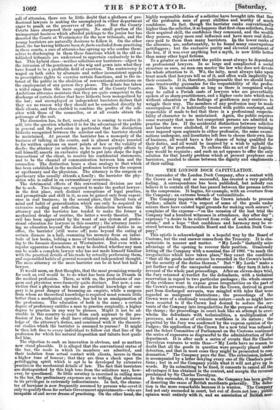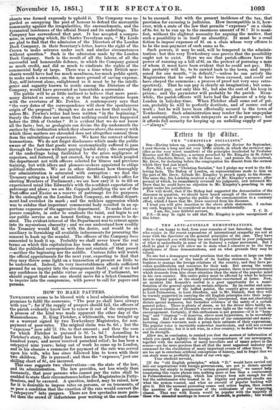THE LONDON DOCK CAPITULATION.
THE surrender of the London Dock Company, after a contest with the Crown so long and so successful, has created a very painful feeling. A correspondence has been published, but nobody can believe it to contain all that has passed between the persons active in the compromise. It begins, for example, with an overture from the Company; an extreme breach of verisimilitude.
The Company inquires whether the Crown intends to proceed further; admits that "in respect of some of the goods under seizure there have existed legal grounds for making such seizure"; complains of the expense—" on the occasion Of the last trial the Company had a hundred witnesses in attendance, day after day"; expresses "a desire to be relieved from evils of such serious mag- nitude," and a hope "that confidence and harmony may be re- stored between the Honourable Board and the London Dock Com- pany."
This epistle is acknowledged in a hopeful way by the Board of Customs, but the real answer comes from the Treasury. It is cha- racteristic in manner and matter. "My Lords" instantly. seize advantage of the opening to recover their position. Graciously letting off the Company with a nominal fine of 1001. "to mark the irregularities which have taken place," they exact the condition " that all the goods under seizure be recorded in the Crown's books for the security of the duties thereon." But "My Lords" make a yet further use of the unexpected concession : they turn it into a reversal of the whole past proceedings. After an eleven-days trial, the Jury returned ai-verdict for the defendants, with a technical reservation in regard to two particular packages ; the whole course of the evidence went to expose gross irregularities on the part of the Crown's servants ; the evidence for the Crown, derived in great part from discharged servants, was mingled with tales that were regarded as malignant fabrications ; the proceedings of the Crown were of a studiously vexatious nature—such as might have been resorted to if the Crown had desired to seduce the ser- vants of the Company into irregularities for the purpose of making the charge ; the proceedings in court look like an attempt to over- whelm the defendants with technicalities, a multiplication of processes, and a mass of evidence worthless in its nature ; the acquittal by the Jury was confirmed by the express opinion of the Judges ; the application of the Crown for a new trial was refused ; and the Select Committee of Parliament on the Customs continued the series of exposures so disgraceful to the administration of that department. It is after such a series of events that Sir Charles Trevelyan ventures to write thus—" My Lords have no reason to doubt that all the goods in question were properly placed under detention, and that in most cases they might be prosecuted to con- demnation." The Company pays the fine. The submission, indeed, is accompanied by a letter denying every one of Sir Charles's posi- tions ; but in act the Company yields what it will not give up in words. By its submitting to be fined, it consents to cancel all the advantages it has obtained in the contest, and accepts the reversal proclaimed by Sir Charles Trevelyan. In this surrender, it appears to us, the Company has been guilty of deserting the cause of British merchants generally. The defec- tion is the more remarkable because it is wanton. The Company had not only succeeded in court, but out of doors.not lees; public opinion went entirely with it, and an association of British chants was formed expressly to uphold it. The Company was re- garded as occupying the post of honour to defend the mercantile community against the irregularities, the encroachments, and the tyrannical insolences of the official Board and its underlings. The Company has surrendered that post. It has accepted a compro- mise, in arranging which, Sir Charles Trevelyan says, " My Lords are glad tor findthe admission of the Directors of the -London Dock Company, in their Secretary's letter, leaves the right of the Crown to make seizures under such and similar circumstances without question." Such is the admission made by the London Dock Company. Such is the result of all the labour, of all the successful and honourable defence, in which the Company gained so much credit, and did so much to vindicate the rights of the commercial body at large. There was a time when British mer- chants would have had too much manliness, too much public spirit, to make such a surrender, on the mere ground of saving expense. Nay, self-interest alone, enlightened as it must be by the intelli- gence and sagacity known to reside among the Directors of the Company, would have prevented so lamentable a surrender. The public will be as little inclined to believe that mere parsi- mony dictated so serious a step as that the negotiations began with the overtures of Mr. Powles. A contemporary says that "the very dates of the correspondence will show the spontaneous "-) o.." in of the proposal"; though we do not see how that could be, '1iess Mr. Powles's letter had been written " in the beginning." Surely the Globe does not mean that nothing could have happened before the 29th of October ? It is evident that we do not know all the facts ; but, as geologists can divine the dip underneath the surface by the inclination which they observe above, the secrecy with which these matters are shrouded does not altogether conceal them from the calculations of experience. We have the context of these transactions. We do not forget disclosures which made the public aware of the fact that goods were systematically suffered to pass through the Customs without paying lawful duty ; the corruption of the underlings being ficilitated by the gross negligence of superiors, and fostered, if not created, by a system which peopled the department not with officers selected for fitness and previous training, but with idlers and pleasure-seekers appointed to oblige political adherents. We see in other directions how thoroughly our administration is saturated with corruption : we find the Treasury acting as a kind of auxiliary to Mr. Ceppock's office for electing Members of Parliament ; we see how easy it is to fill an experienced mind like Edwards's with the confident expectation of Ptronage and place ; we see Mr. Coppock justifying the use of the ost-office and Excise as a reserve of patronage for his purposes. In the onslaught on the London Doek Company, an official depart- ment had overshot its mark ; and the reckless aggression which was to subdue that important commercial body resulted in an op- portune exposure of the aggressive department. To make that ex- posure complete, in order to eradicate the taint, and begin to set our public service on an honest footing, was a process to be de- sired. The evident interest of the Department was to retreat again into its mysterious obscurity ; and we can understand how readily the Treasury would fall in with the desire, and would be an auxiliary in furnishing all available inducements for procuring the consent to hush up the scandal. The officers of the Company have consented to hush it up. Probably we shall never know the real terms on which this capitulation has been effected. Certain it is that the published correspondence does not contain all that passed —neither the beginning nor the middle. Curious folks will watch the official appointments for the next year, expecting to find that they may throw some light on a transaction at present so little to be understood. Indeed, its very inscrutableness affords sufficient ground for an inquiry into the arrangement itself ; and if we had any confidence in the public virtue or capacity of Parliament, we should suggest that some one should move for a Select Committee to inquire into the compromise, with power to call for papers and persons.



























 Previous page
Previous page